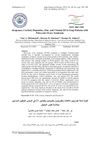 December 2023 in “Journal of nutritional science and vitaminology”
December 2023 in “Journal of nutritional science and vitaminology” A zinc-deficient diet stunted growth and affected organs in mice, with C57BL/6J mice showing more severe symptoms.

Zinc levels and lymphocyte counts might be important in heart disease development.
 1 citations,
July 2023 in “Frontiers in Immunology”
1 citations,
July 2023 in “Frontiers in Immunology” Oxidative stress and immune dysfunction are linked to both Hashimoto's thyroiditis and polycystic ovary syndrome, with diet and specific treatments important for managing these conditions.
 September 2022 in “International Journal of Health Sciences (IJHS)”
September 2022 in “International Journal of Health Sciences (IJHS)” Low zinc levels may contribute to hair loss due to increased oxidative DNA damage.
July 2022 in “Dermatologica Sinica” Many women with hair loss also have zinc deficiency, iron depletion, or thyroid issues.
 2 citations,
May 2021 in “Case reports in dermatological medicine”
2 citations,
May 2021 in “Case reports in dermatological medicine” A 28-year-old man with type 1 diabetes had skin and hair issues due to zinc deficiency.
 19 citations,
March 2021 in “Obesity surgery”
19 citations,
March 2021 in “Obesity surgery” Many people experience hair loss after weight loss surgery, especially younger women, and it's linked to lower levels of zinc, folic acid, and ferritin.
 5 citations,
December 2014 in “Polish Journal of Public Health”
5 citations,
December 2014 in “Polish Journal of Public Health” Zinc is essential for many body functions and imbalances can lead to health problems.
 27 citations,
May 2010 in “Dermatologic Clinics”
27 citations,
May 2010 in “Dermatologic Clinics” Zinc can be a helpful secondary treatment for certain skin conditions, but more research is needed to guide its use.
 24 citations,
July 1987 in “Dermatologic Clinics”
24 citations,
July 1987 in “Dermatologic Clinics” Systemic diseases can cause hair loss, which is often reversible with treatment.
 January 2023 in “Theranostics”
January 2023 in “Theranostics” A patch with curcumin-zinc can improve hair growth and health by delivering beneficial particles to the skin, increasing hair follicles, and reversing effects of a hair loss hormone.
 35 citations,
January 2006 in “Journal of Dermatological Treatment”
35 citations,
January 2006 in “Journal of Dermatological Treatment” Zinc can help with some skin problems, but its effectiveness varies depending on the condition.
 December 2024 in “Nutrients”
December 2024 in “Nutrients” Skin, hair, and nail changes can help detect eating disorders early.
36 citations,
October 2008 in “European journal of paediatric neurology” Valproic acid treatment may cause temporary hair loss due to reduced zinc and biotinidase levels, which tend to normalize after 6 months.
 3 citations,
April 2021 in “Cureus”
3 citations,
April 2021 in “Cureus” Low Vitamin D is common in people with Alopecia Areata, but its impact on the condition needs more research.
 13 citations,
June 2020 in “International Journal of Dermatology”
13 citations,
June 2020 in “International Journal of Dermatology” A rare scalp condition mainly in older women can be treated with various alternatives to steroids, which may have fewer side effects.
 October 2018 in “InTech eBooks”
October 2018 in “InTech eBooks” The most effective treatments for hair loss are minoxidil, finasteride, PRP, and hair transplants, with steroids and immunosuppressants for autoimmune types.
 4 citations,
December 2022 in “International Journal of Molecular Sciences”
4 citations,
December 2022 in “International Journal of Molecular Sciences” Zinc is crucial for skin health and treating various skin disorders.
 5 citations,
July 2017 in “Women & Health”
5 citations,
July 2017 in “Women & Health” Nursing women in the West Bank with higher income and non-smoking habits have higher blood zinc levels.
 February 2025 in “Iraqi Journal of Science”
February 2025 in “Iraqi Journal of Science” PCOS patients have higher LDH and lower cortisol, dopamine, zinc, and vitamin D3, which may contribute to their symptoms and obesity.
 11 citations,
January 2014 in “The Scientific World Journal”
11 citations,
January 2014 in “The Scientific World Journal” Cynatine HNS improves hair and nail quality in 90 days.
 December 2023 in “Research in pharmacy”
December 2023 in “Research in pharmacy” Phytotherapeutic compounds and supplements can help manage Polycystic Ovarian Syndrome (PCOS).
 January 2021 in “ISGE series”
January 2021 in “ISGE series” Polycystic ovary syndrome causes chronic inflammation affecting all body systems, but proper nutrition, exercise, and supplements can improve the condition.
7 citations,
January 2017 in “Indian Journal of Dermatology, Venereology and Leprology” 
Penicillamine can cause taste problems due to copper loss, which can be fixed with copper or zinc supplements.
September 2022 in “Ukraïnsʹkij naukovo-medičnij molodìžnij žurnal” Quality pharmaceutical care is crucial for safe and effective use of vitamin-mineral supplements during pregnancy and breastfeeding.
 12 citations,
September 2022 in “Foods”
12 citations,
September 2022 in “Foods” Some nutraceuticals may help in COVID-19 prevention and treatment, but more research is needed.
 January 2020 in “Asian journal of applied science and technology”
January 2020 in “Asian journal of applied science and technology” Good nutrition is crucial for health and preventing disease, and supplements can help prevent nutrient deficiencies.
 11 citations,
January 2020 in “BMC pediatrics”
11 citations,
January 2020 in “BMC pediatrics” New mutations in the SLC39A4 gene found in twins help understand the genetic cause of acrodermatitis enteropathica.
 32 citations,
November 2011 in “International Journal of Dermatology”
32 citations,
November 2011 in “International Journal of Dermatology” Diagnose and manage CCCA with thorough history, exams, and labs; treat with anti-inflammatory agents, stress reduction, and stopping harmful hair practices.


























